Zubatcarteira
Now you're infected by the Musical Doodle
https://i.*****.com/AuBh0m1.png
The Outer Worlds doesn't really even come close to meeting the standards for grimdark.Talking of jokey* grimdark, I was reminded of Obsidian's Outer Worlds. Not that I think Larian would be interested in it, but I think it underlines computer geek's inability to design good settings. Because frankly, it's boring, and rewards you with "it doesn't matter what decisions you made, because everyone is doomed anyway". Which is a bit of a pattern for Obsidian. See Pillars of Eternity or Tyranny. I think CRPGs benefit enormously from established IPs (and rulesets). And it would be nice to spend time in a world which still had some hope left in it for a change.
*Well, the writers clearly put in stuff because they thought it was funny. A lot in common with DOS really.
The best ending I could get: "sure you have destroyed the evil corporations, but everyone is going to die anyway in a few years because the colony cannot produce enough resources for everyone".The Outer Worlds doesn't really even come close to meeting the standards for grimdark.
It's just a bog-standard corporate dystopia. There are actual good guys and bad guys, it's not amoral, it's not doomed, and whilst you can't fix everything, there is hope! You're absolutely not doomed. I don't think it's even possible to pick a "doomed" ending except by having a low-INT character try and make the jump by themselves! Spoilers but you can destroy the Board.
PoE2: "there is nothing you can do to prevent the destruction of the wheel, which means souls will not be reborn, so everyone will die out due to not having a soul within a generation."Pillars of Eternity, likewise, isn't even close to grimdark.
Maybe you should try and get better endings lol? That you get bad ones doesn't make the game grimdark. That's like me saying ME2 is grimdark if I screwed up the suicide mission so bad even Shepard died.The best ending I could get: "sure you have destroyed the evil corporations, but everyone is going to die anyway in a few years because the colony cannot produce enough resources for everyone".
PoE2: "there is nothing you can do to prevent the destruction of the wheel, which means souls will not be reborn, so everyone will die out due to not having a soul within a generation."

Well that is the lightning in the bottle element. Having a solid success from your game, sure you might expect that. Your game making a billion dollars, winning every award out there, and changing the scope of the market.....that is not something that always happens even if you work hard and plan for it.To be real, I don't think they caught lightning in a bottle here. ... Now, it making $1bn+ (maybe a lot + now) was unexpected to a lot of people, but you had to be a little shortsighted to not expect it to make hundreds of millions, to not sell 10m+ copies.
I just don't really think it is. The market is ever-expanding (for now). When you spend money on quality work, and present an RPG that's accessible and not very challenging conceptually (the most challenging element being turn-based, honestly, but that's still wildly more popular now than, say, 5-10 years ago), people buy it, because the market is nowhere near saturation. We'd probably have to release 2-3x as many AAA RPGs per year to hit saturation (whereas shooters, for example, esp. competitive multiplayer ones, are wildly over-saturated). Maybe they couldn't have "counted" on $1bn, but they could have "counted" on probably $400-500m.Well that is the lightning in the bottle element. Having a solid success from your game, sure you might expect that. Your game making a billion dollars, winning every award out there, and changing the scope of the market.....that is not something that always happens even if you work hard and plan for it.
I'm feeling so called out right now.https://i.*****.com/AuBh0m1.png
